|
RIPSTER REVIVALS #19
Sometimes known as The Getting Away With Murder Club, or the "Oh no, more ramblings" column from the world of (mostly) crime fiction and thrillers. Books read, re-read and still to be read; old favourites rediscovered, new gems uncovered.
|
Hot Off The Press (New Releases)
In anticipation of attending Venice Noir (14-16 November) I made sure I had done my homework on at least two of the writers I hope to meet there, David Hewson and Carlo Lucarelli, by reading their latest novels.
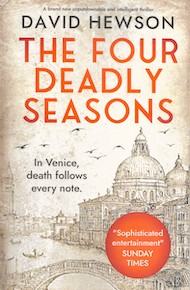
![The Darkest Winter [Open Borders Press] by Carlo Lucarelli](/Images/features/610/Lucarelli.jpg)
The Four Deadly Seasons [Bloodhound Books] is David Hewson’s third book to feature retired archivist Arnold Clover now living a quiet ex-pat life in Venice. Clover is persuaded to research and write a book about composer Antonio Vivaldi about whose life little is known, despite being Venice’s ‘most famous son’ (though I always thought that was Marco Polo or Casanova). Despite Clover’s insistence that he knows nothing about music, his archivist instincts are on full alert as the project soon involves a suicide, some operatic violence on the Vienna-Venice night train and any amount of double-crossing along the murky canals before a plot worthy of the Cold War is revealed. My only caveat is that the average reader will not know Venice as well as David Hewson clearly does and so will be crying out for a map.
The Darkest Winter [Open Borders Press] by Carlo Lucarelli does come with a map, of Bologna in the winter of 1944. Lucarelli’s outstanding series (a far too short series) hero, Commissario De Luca, Bologna’s most brilliant criminal investigator, has to navigate a dangerous path through the worst winter for decades, Allied bombing, the occupying SS troops, partisans, the political police and the pro-Fascist Black Brigades, to solve three murders. Intense, atmospheric and superbly researched, Lucarelli again proves himself a master of historical material and a finely tuned novelist.

Still in World War II and again translated from the Italian, Smoke In Berlin [Hemlock Press] by Oriana Ramunno has a diligent Berlin police detective working under duress for his Nazi bosses. Comparisons with the late Philip Kerr’s Bernie Gunther will no doubt be made but in Hugo Fischer, Ramunno has created a much more vulnerable hero; not only does he suffer from MS (a condition he has to conceal) and trauma from solving a murder case in Auschwitz (!) as well as hiding a young Italian Jewish boy he has helped rescue from the gas chambers.
Fischer may lack Gunther’s self-confidence and ability to crack wise in the face of danger, but he is a righteous hero at a time when heroes were really needed and fans of Bernie Gunther suffering withdrawal symptoms should give him a try.
{As an aside, I hear that Slow Horses actor Jack Lowden is to play Bernie Gunther in the upcoming television series based on Metropolis, Philip’s last novel. I remember having lunch with Philip back in 2016 and him telling me that Tom Hanks was to be an executive producer when it came to getting the Gunther books to the screen. That was almost ten years ago, which just proved the wheels of television grind exceeding slow.}
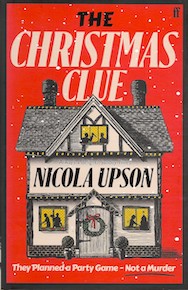
First out of the traps with a Christmas novella is Nicola Upson with The Christmas Clue [Faber] and it’s a real Christmas treat and the perfect accompaniment to the mince pies and brandy. It’s Christmas 1943 and the setting is a snowbound English country house where the guests gather to play a murder mystery only to discover a real murder. Fortunately for them the couple Anthony and Elva Pratt are on hand to do the detecting. Fortunately for everyone else the Pratts were the real life inventors of the game Cluedo so I for one am staying clear of swinging candlesticks and not going anywhere near the library.

Continuing the Christmas theme Antony Johnston gives us The Dog Sitter Detective’s Christmas Tail [Allison & Busby later this month], the fourth in his ‘Sitter’ series featuring the actress Guinevere ‘Gwinny’ Tuffel, who dog sits as a side hassle whenever ‘resting’ which she does quite often, in another cosy mystery. The series has already won a Barker Book Award – well it would, wouldn’t it – and comes with an assurance that despite the murder and mayhem, no dogs are harmed in the telling of the stories.

Published in English for the first time, and in a very attractive edition, is a classic historical mystery set in Edo-era Japan, The Samurai Detectives by Shotaro Ikenami, Volume 1 of which is now out from Penguin, with Volume 2 to follow in February next year. Shotaro Ikenami (1923-1990) was a bestselling author of popular historical novels and Samurai Detectives is regarded as his greatest work, having sold more than 24 million copies in Japan, featuring a trio of skilled swordsmen, or rather two swordsmen and a frighteningly skilled female warrior you wouldn’t want to cross swords with.

And now a crime novel so new it is not actually published for another six months, though a few lucky people have been treated to an advanced proof of Last One Out by Jane Harper, which is available to mere mortals in April 2026. Jane Harper is the Queen of Australian Outback Noir – and if that’s not a thing, it should be – and the author of the award-winning and bestselling The Dry and, my favourite, Force of Nature.

Despite revelling in my undeserved title of ‘unofficial historian of the British thriller’, I have to admit that I had never heard of fictional spy Michael Dene, otherwise known as Dene of the Secret Service. He was the creation of Gerald Verner, one of several pen-names used by the prolific John Robert Stuart Pringle (1897-1980) who wrote at least 120 books over a variety of genres. The trilogy of novels featuring Michael Dene – The Seven Clues (1936), Dene of the Secret Service (1941) and The Heel of Achilles (1945) – have just been reissued by Lume/Joffe Books.
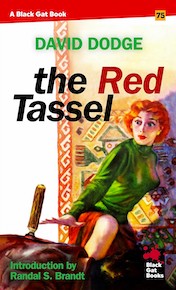
Another welcome reissue is The Red Tassel by that much-travelled American David Dodge (1910-1974) who was the subject of my second ‘Revival’ back in March, from those ultra-enthusiastic publishers Black Gat Books in California. Dodge, famous for his To Catch A Thief (filmed by Hitchcock), was an acclaimed travel writer as well as a mystery writer and for a time lived in South America which inspired three novels featuring his tough and resourceful international private eye Al Colby. His best-known adventure, Plunder of the Sun, ends with Colby in Bolivia and that is the starting point of The Red Tassel, first published in 1950, in which he investigates corruption and theft in a silver mine high in the Bolivian Andes where the action is literally breath-taking.
From the To-Be-Read (or Re-Read) Pile
I have said it before and will almost certainly say it again, but I had forgotten what a good writer the late Reg Gadney was and I can’t understand why it has taken me so long to discover The Last Hours Before Dawn, which I think was his fifth novel, published in 1975.
It is a captivating story, part romance, part spy story, centred on a mature, intelligent woman recently widowed, who finds herself running a farm on the Suffolk coast (probably near Southwold, an area Reg knew well) in the middle years of WWII. Apart from the perils of wartime, Victoria Wymering is beset by three male suitors and how she negotiates her feelings for them is at the heart of the book. One is the naïve 17-year-old son of the local vicar, one a grizzled veteran of WWI blinded in an air raid, and one a half-French SOE operative who is betrayed on a sabotage mission in occupied France and ends up in Buchenwald.
The narrative swings between the home front in Suffolk and the Special Operations Executive’s mission in France, which is described in convincing detail. All the characters in The Last Hours are multi-dimensional and believably human and Gadney cleverly manipulates the reader’s sympathies to all of them.
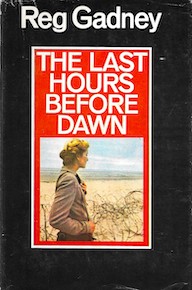
Reg Gadney (1941-2018) was not only a versatile thriller-writer, but a gifted painter (he even painted my portrait!) and art historian. We met because we both wrote for The Guardian rather than anything to do with crime-writing, which Reg regarded as a secondary career to his painting. When I approached him for the rights to republished his first two novels as Top Notch Thrillers in 2015, he granted them on the spot saying, with a twinkle in his eye: “Just remember, I may never have had an agent, but I’ve got bloody good lawyers.”
My other abiding memory of Reg was his claim to have been ‘the fifth James Bond’ as he played the American ornithologist James Bond in the Ian Fleming biopic Goldeneye for which he wrote the script in 1989.
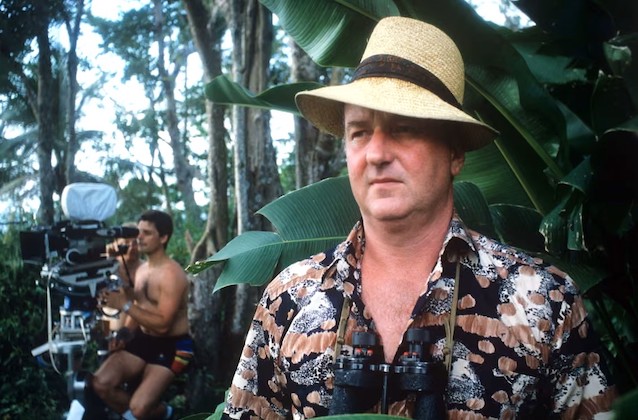
Reg Gadney on location as James Bond
*
John Buchan’s The Island of Sheep (1936) has been called ‘the forgotten Hannay’ (I’d certainly forgotten it) as it was written more than a decade after Richard (39 Steps) Hannay’s heyday as Imperial Britain’s best-known not-so-secret agent. After a back story in Africa in his colonial days, Hannay is called upon to fulfil a promise he made to look after the family of a legendary Danish minerologist and treasure hunter, who has, it is assumed, amassed considerable treasure. Naturally there is a gang of well-connected thieves after said treasure and twenty years on, their descendants along with some international thugs join in the hunt.
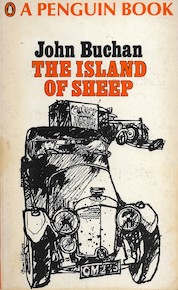
Richard Hannay, his 14-year-old son and assorted aristocratic chums jump into action, first in England then Scotland and finally on the Island of Sheep which might just be one of the Faroe Isles. There, with our heroes (and a single heroine) under siege, the cavalry riding to their rescue comprise the blood-stained local population who have just completed their annual slaughter of pilot whales.
By far the best action scene is a motor-car chase up the entire Great North Road at spectacular speeds for 1936 with allowances for the roadworks near Scotch Corner. (Note to Mr Buchan; those roadworks are still ongoing.)
There are classical and Biblical references throughout which might puzzle to modern reader. One adventurer his in search of his personal Ophir (a Hebrew term for a place of riches), another character follows an apolaustic life (devoted to pleasure) and the BBC no less is accused of sciolism. But my favourite Buchanism is when characters have a tendency to fossick about and I am determined to start a campaign for more use of that F-word, starting with a letter to Dame Susie Dent.
Ice Cold in Albania
I was not aware, though I should have been that Anthony Quayle’s 1945 novel Eight Hours From England had been reissued by the Imperial War Museum as a ‘Wartime Classic’. It is an attractive edition (despite the fact that the figure on the cover resembles Captain Haddock from the Tintin stories) and very welcome as the first of only two novels penned by Sir Anthony, the actor best known for his roles in films such Ice Cold in Alex, The Guns of Navarone, Lawrence of Arabia and Operation Crossbow as well as a distinguished career in the theatre.
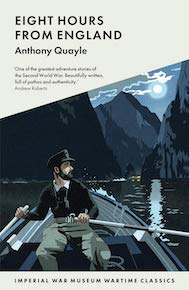
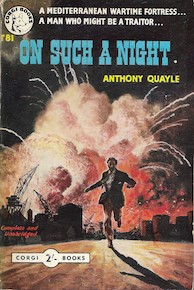
Eight Hours From England is clearly more of a memoir than a novel, based closely on Quayle’s mission to occupied Albania in 1944 as an agent of the Special Operations Executive, and that is in no way a drawback. The story of how Major Overton (Quayle), with little help, attempts to encourage resistance to the Germans by the various Albanian political factions, communist partisans and disorganised Italian soldiers now fighting for the Allies, is told in an unfussy, unheroic manner and rings totally true.
His second novel, On Such A Night, followed in 1947 by which time Quayle was out of uniform and making his name as a noted Shakespearean actor. It was to be his last foray into writing fiction and is based on his early wartime experiences in the Royal Artillery based on Gibraltar, which is called Palleria in the book for some reason. Ostensibly a spy story about a British cabinet minister suspected of treason on a stopover flight in Palleria/Gibraltar en route to the Middle East. The action, such as there is takes place over a single evening in 1942, mostly at a dinner party thrown by the Governor General. The dialogue between the military officers (and other ranks) certainly rings true, with one notable exchange when the general addresses a truculent regimental chaplain: ”Your outlook is different from mine, Padre. You are waging an eternal fight against the devil. I am occupied with a comparatively short-term difference of opinion with the Germans.”
Eight Hours From England is by far the more deserving of reissue and the Imperial War Museum have made a fine job of it, although a map would have been useful. I have also promised myself to track down another reissue in the Museum’s Wartime Classics series, Alexander Baron’s 1948 novel From the City, From the Plough which my old pal Len Deighton has been recommending me to read for many years.
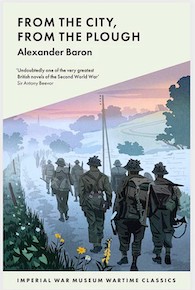
I have also discovered that in the 1930s, Baron was a close friend in the Labour Party of Ted (later Lord) Willis, the thriller writer and creator of Dixon of Dock Green, who not only gave one of my early novels a rave review in the Daily Telegraph, but has the dubious honour of being the first peer to take me to lunch in the House of Lords. So that’s another reason if I needed one, which I usually don’t, to read it.
It Happens To Us All
I have always made a point of trying to read the work of authors I have met for the first time and following a meeting at a party in the summer, I made a point of keeping an eye out for anything by history-mystery writer Alec Marsh. When I saw a copy of his Cut and Run [Sharpe Books] reasonably priced on Ebay, I snapped it up as it seemed to be his most recent novel (2024).
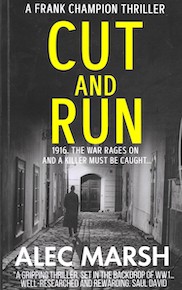
I soon realised that I had not read the seller’s description properly and discovered this was a used copy and had been signed by the author. I hesitate to use the expression “much loved” as this copy clearly had not been. According to the dedication penned by the author, it was given new as a Christmas present to someone called Hugh in December 2024, yet within a few months was on Ebay. I immediately felt sympathy for Alec Marsh to have his book so swiftly spurned, because I knew exactly how he felt. A signed first edition of my debut novel Just Another Angel turned up in a Leicestershire charity shop some time ago, complete with a bookmark showing the reader had only got to page 35. It was the copy I had given to my mother-in-law in 1988.
Young Offenders
You know you are getting old when the protagonists of crime stories – and their readership – get younger. I am not thinking of the excellent Young Adult books by, say, Anthony Horowitz and also Charlie Higson, but the latest in the famous Mr Men series: Mr (not Monsieur) Poirot in Mischief on the Nile.
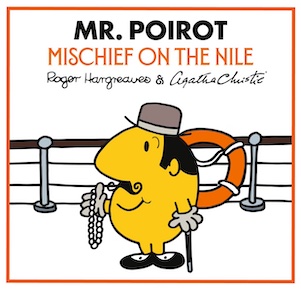
I believe there is also a Little Miss Marple who appears in Muddle at the Vicarage and I am sure my readers will have suggestions for future titles and I am sure all will be politically correct and will not offend any caring parents.
I understand that ‘Trigger Warnings’ are now issued on works of literature for the guidance of adults and university students of a nervous disposition. This did not seem to be the case back in 1941 with another character extremely popular among young readers.

It was a different time.
Ciao for now,
The Ripster